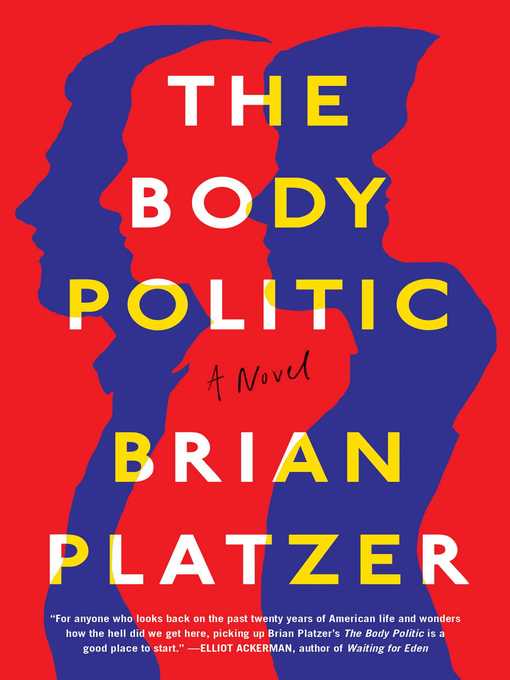
The Body Politic
A Novel
کتاب های مرتبط
- اطلاعات
- نقد و بررسی
- دیدگاه کاربران
نقد و بررسی

October 1, 2019
Platzer's second novel (after Bed-Stuy Is Burning) follows a closely interconnected set of friends in New York City from 9/11's aftermath to the 2016 election. Off-Broadway actress Tess and corporate mover David are married and seem perfect together, except Tess has an affair and they go temporarily off-track. When they are reunited, David, showing off a bit for a son, falls from a ladder and is almost entirely incapacitated. Tess becomes his caretaker, aided by Tazio, David's best friend, a Cooper Union prodigy, who also shares a one-night history with Tess. Tangled web? Yes, and add striking Angelica, a dentist and fiancée (vaguely) to Tazio, and there's the cast. The story settles around overcoming: past history and David's mysterious, untreatable (conventionally, anyway) illness. Subplots involve confrontations by the two women of sexual abusers. Tazio turns from the group and enters the political world, first as a John Edwards campaign exec, then in virulently anti-Trump mode, and finally as a Trump staffer. In the end, nothing is really settled, but all the characters are getting on. VERDICT An inherently character-driven tale, beautifully written, and a fine example of a long, strange trip. Note: pro-Trumpers would be well advised not to pick this up.--Robert E. Brown, Oswego, NY
Copyright 2019 Library Journal, LLC Used with permission.

January 1, 2020
A New York couple faces medical and personal difficulties during the national malaise of the Trump years. When we meet Tess, a Broadway understudy and mother of two, she is celebrating her 37th birthday alone in a bar. Eight months ago, shortly after she confessed to cheating on him with a fellow actor, her husband, David, fell off a long ladder at an upstate New York apple-picking orchard, and his head injuries resulted in a debilitating, long-term vestibular disorder (also suffered by the author). Once filled with so much "buoyancy and good cheer" that he would dance upon getting up in the morning, now David feels leaden and can barely function. As he writes in a journal Tess reads without permission, "Some days I think I'm lucky to be with someone who's suffered. Seen what she's seen and survived true depression. Other days I think I need someone less damaged, someone who can devote herself more fully to helping me." The journal also documents David's desperate visits to alternative practitioners that ultimately do nothing but ruin the family financially. There are many more complications--too many--some having to do with Tess' past, other with David's best friend, Tazio (whom David nursed back to health after liver failure and whom Tess is in love with), and Tazio's fiancee, Angelica. Tazio is an art student-turned-politico, and his story arc contains, among other things, a deep dive into the John Edwards campaign and a position in the Trump administration. As he makes the rounds of the male and female characters, Platzer (Bed-Stuy Is Burning, 2017) often seems to be searching for answers himself. For example, after Tess and Angelica attempt to resolve their past traumas by pairing up for #MeToo type confrontations, the author tries to evoke Tess' state of mind with a series of questions: "Maybe...seeing your father kill your mother is something you can't ever get over. Maybe it is worse than rape, especially if you loved your rapist." Elsewhere: "What if Tazio is planning on killing Trump?" Fewer storylines and less topical content might have helped. Platzer writes confidently about marriage and illness, but there's too much else going on.
COPYRIGHT(2020) Kirkus Reviews, ALL RIGHTS RESERVED.

February 17, 2020
Platzer’s uneven second novel (after Bed-Stuy Is Burning) traces the fates of four New Yorkers in the aftermath of President Trump’s election. Tess and David, a married couple, are reeling from revelations of Tess’s infidelity, the struggles of raising two adolescent boys, and the effects of an accident that left David with debilitating mental and physical symptoms. Their mutual best friend, Tazio, and his girlfriend, Angelica, step in to help Tess and David, but Tazio and Angelica are grappling with their own problems. Tazio is distraught after having worked for Hilary Clinton’s unsuccessful campaign; Angelica, meanwhile, wants more of a romantic commitment than Tazio seems ready to give. The close proximity brings memories (both good and harmful) of Tess and Tazio’s time together as art students. Readers are told these four love one another, but as past betrayals come to light and new ones are revealed, it becomes difficult to believe the strength of their bond. Platzer’s prose, however, can be moving, particularly in the depictions of David’s medical condition. But ultimately, this character-driven drama is hobbled by unbelievable and inconsistent characters.

December 1, 2019
Shortly after getting back together with Tess in the wake of an affair, Dave falls from a ladder and begins suffering from vertigo that no doctor can cure. Tess cares for him but grapples with her own regrets. Their longtime mutual friend, the artist and Hillary campaigner Tazio, disappears in the election's wake, leaving his and Angelica's engagement in question. Platzer's (Bed-Stuy is Burning, 2018) second novel is about four friends in their thirties in New York City. But The Body Politic is bold in other ways. Firmly set in the almost-present aftermath of the 2016 election, it's propelled by real-world headlines: Donald Trump is president, rapists are publicly confronted, longtime relationships are tested by moral questions being considered on a national stage. The importance of grounding the novel in its contemporary setting sometimes takes center stage away from the characters, who often speak in paragraph-long gulps that don't move the emotional situation forward. Still, there is a realism to this that certain readers will appreciate.(Reprinted with permission of Booklist, copyright 2019, American Library Association.)

























دیدگاه کاربران